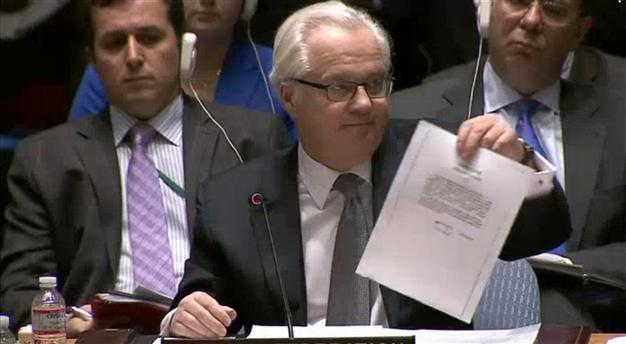Yanukovych asked Putin to use force to save Ukraine: Russia
UNITED NATIONS - Reuters

Vitaly Churkin shows a letter to the U.N. Security Council purportedly from Yanukovich to Putin asking the Russian leader for military intervention in Ukraine. REUTERS Photo
Ukraine's ousted leader Viktor Yanukovych has sent a letter to Russian President Vladimir Putin requesting that he use Russia's military to restore law and order in Ukraine, Moscow's U.N. envoy told a stormy meeting of the Security Council on March 3.
"The country has plunged into chaos and anarchy," Russian Ambassador Vitaly Churkin read from an unofficial translation of the letter while speaking to reporters after an emergency meeting of the U.N. Security Council. "The country is in the grip of outright terror and violence driven by the West."
"People are persecuted on political and language grounds," he read. "In this context, I appeal to the President of Russia Vladimir Putin to use the armed forces of the Russian Federation to re-establish the rule of law, peace, order, stability and to protect the people of Ukraine."
Churkin held up a copy of the letter for council members to see during a heated council session in which Western envoys and the Russian ambassador hurled allegations at each other for two and a half hours. He said the letter was dated March 1.
After the Russian ambassador spoke, U.S. Ambassador Samantha Power dismissed Russian claims that Russian-speaking Ukrainians were under threat in the eastern regions of the former Soviet republic.
"There is no evidence that ethnic Russians are in danger," she told the 15-nation council, which is holding its third emergency session on Ukraine in four days, this time at the request of Russia.
Power said there was "no legal basis" for Russia to justify its military deployments in Ukraine through an invitation from the regional prime minister of the Crimea, adding only Ukraine's parliament could do that.
"Russia has every right to wish that events in Ukraine had turned out differently," she said. "But it does not have the right to express that unhappiness by using military force or by trying to convince the world community that up is down and black is white."
Yanukovych 'legitimate leader' Churkin rejected Power's denials and said she appeared to have gotten all her information about Ukraine "from U.S. TV." He repeated Moscow's view that Yanukovych is Ukraine's legitimate leader, not interim President Oleksandr Turchynov.
British Ambassador Mark Lyall Grant also rejected Russian allegations of acts of terrorism and threats against ethnic Russians in Ukraine. "It is clear that these claims have simply been fabricated to justify Russian military action," he said, dismissing Yanukovych's letter to Putin as meaningless.
"We are talking about a former leader who abandoned his office, his capital and his country, whose corrupt governance brought his country to the brink of economic ruin, who suppressed protests against his government, leading to over 80 deaths," Lyall Grant said.
He added that he would not rule out introducing a resolution on the Ukraine crisis in the coming days.
The council met on Feb. 28 and March 1 to discuss the crisis in eastern Ukraine but took no decisions, as expected. Both meetings highlighted the deep divisions between the United States and other Western nations and Russia, which has a major Black Sea naval base in the Crimea region.
On Feb. 28 session, Ukraine accused Russia of illegal military incursions onto Ukrainian territory, while U.S. and European delegations warned Moscow to withdraw any new military forces deployed in neighboring Ukraine.
Russia, however, said any military movements by Russian forces there were in compliance with its agreement with Kiev on maintaining its naval base there. On Saturday, the United States called for international observers to be deployed to Ukraine.
